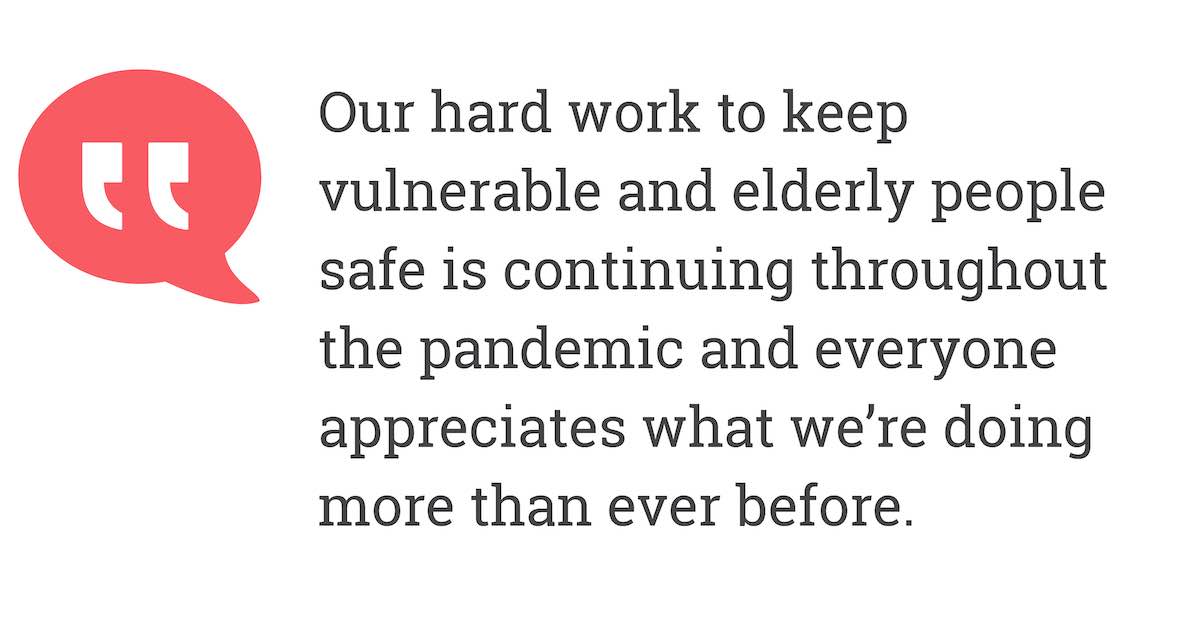 "I think, particularly since the coronavirus pandemic, peoples’ attitudes toward social carers has shifted."
"I think, particularly since the coronavirus pandemic, peoples’ attitudes toward social carers has shifted."Health Care Assistant, Grant Fullerton Sinclair, discusses his career journey into care, what a typical day looks like, and highlights what it takes to become a HCA.
Topics covered in this article
Why I decided to become a Health Care Assistant
This is what I love about my job
What does a typical day look like?
My interview tips for Health Care Assistant job roles
What are the differences between working in the NHS and the private sector?
What are the challenges faced by Health Care Assistants?
What are the benefits of working as a Health Care Assistant for an agency like Newcross?
What is the current state of personalised care in the UK?
What does the future of a care worker look like in the UK?
What kind of settings do Health Care Assistants work in?
What are the career prospects for Health Care Assistants?
What qualifications do you need?

Search Jobs
1000s of jobs for Nurses & Care Professionals. No.1 for UK nursing, care & healthcare jobs.
Search JobsWhy I decided to become a Health Care Assistant
I always had an interest in science, medicine and helping others.
I took an undergraduate degree in Bio Medical Science at the University of the West of England, with a view to studying medicine, but opportunities along the way shaped my journey in a different direction.
Alongside my studies I have also worked in a variety of healthcare roles.
For example, I spent 18 months in a residential care home supporting older people living with dementia.
I subsequently worked as a team leader for over 4 years, supporting individuals with acquired brain injuries, learning disabilities and other complex health needs, to live in their own homes.
This gave me an insight into the importance of care work and I hope eventually to secure a senior role in a care environment.
It is important to me to pursue my studies and I’m now working towards the final stages of an MSc in Mental Health Nursing through Swansea University.
When I finish, I will be ready to move into a frontline, qualified Mental Health Nurse position due to start in September 2020.
(You can find our more about Mental Health Nursing at Nurses.co.uk.)
In the meantime, I’m building up my experience working as an HCA with Newcross Healthcare in Bristol, primarily providing care to service users with complex needs in their home.
I am due to start my final management clinical placement, as part of my nurse training in the next few weeks.
I am both excited and nervous, especially due to the current circumstances.
This is what I love about my job
Being a HCA is a really positive thing to do. I am able to help service users bring some normality (and dare I say it, fun) into what can often be a challenging and quite serious environment.
We spend time together doing some really cool stuff which makes both them and I very happy.
The ability to make someone smile, build their confidence and help them to do what they want to do (not what they are so often told to do) is hugely rewarding.
Even when they face challenges, we can often work together to find a solution, or bring in another party who can offer help.

What Do You Think?
Ask questions, comment and like this article below! Share your thoughts, add your opinion in the comments below.
CommentWhat does a typical day look like?
Currently, I’m working with two or three individuals (or ‘care packages’) in their own home.
They may have a physical disability, learning difficulties, mental health issues or a combination of these things.
I go to their house first thing, help them wash and dress and get ready for the day.
Members of the family are often also around, so it’s important to give them privacy when they want it, at mealtimes for example.
Depending on the needs of the individual, we may spend an hour or so on physio and doing some stretching.
I help them to use any equipment they have at home.
Then, usually (when we are not in a lockdown situation), we might go out for a coffee, a walk in the park, play some chess or watch a film.
It’s important to support these kinds of activities where the service user is getting out into the community, building relationships and confidence to be independent.
It also gives the family a break.

Of course, I help with personal care and some medical needs, but the role is just as much about companionship.
My interview tips for Health Care Assistant job roles
• Be prepared to talk about your past care experience in detail, particularly about the specialist skills you have picked up in healthcare and any transferrable skills you may have had from non- healthcare related roles.
• If you’ve done a relevant apprenticeship or NVQ, you should be sure to explain how this has helped you in your day-to-day care role
• If you’re applying for a private sector role, check out the values of that company.
You’ll need to be able to talk about how you have demonstrated those in the care you have delivered
• Show your personality – you’ll need to be a people-person and demonstrate great bedside manner and interpersonal skills to work well as part of a team.

Become A Community Contributor
Share your story to help and inspire others. Write or create a video about your job or your opinions!
ContributeWhat are the differences between working in the NHS and the private sector?
In terms of the kind of work you do day-to-day, there’s not too much of a difference.
In the private sector, you get a lot more flexibility to specialise in certain types of care and train in areas of your choosing.
You can also get more flexible hours, which has been really useful for me as a student, and additional perks like instant pay and private healthcare with Newcross.
What are the ideal soft skills required to be a successful Health Care Assistant working in personal care?
Above all, you need to be able to listen, be patient and accept that everyone will be different and have their own quirks.
You need to be trustworthy of course, and empathetic.
A sense of humour is also a bonus.
If you are spending 12 hours a day with someone, you need to be able to have a laugh together.
What are the challenges faced by Health Care Assistants?
For me personally, the hardest thing in this kind of job is the feeling of helplessness, when there is something you can’t change.
It can be emotionally very tough.
But very often, if you look beyond the obvious, there are resources and people you can bring in to improve many situations, there is often something or someone who can help.
What are the benefits of working as a Health Care Assistant for an agency like Newcross?
The flexibility of the role is a big thing for me. It’s not a traditional agency set-up – we are all employees with guaranteed hours.
I can choose the hours that work for me and fit them around my own study and personal life.
There are always opportunities for learning, online training.
I’ve just completed the COVID 19 and PPE specific courses.
I’ve also received some specialist training to support service users with a peg feeding regime for a package I was working on.
There’s good variety in the work I can do and Newcross.
And when you are offered a package, there is a real emphasis on the importance of chemistry between the carer and the service user.
It’s essential that you are a good match if you’re going to spend many hours together!
What is the current state of personalised care in the UK?
From my own experience, I know that we’re able to make use of the latest tech to provide more bespoke care for our service users, while providing a transparent at-a-glance view to their family members or guardians.
At Newcross, we create digital profiles of our service users with the PASSsystem.
We use this system to record all activity, according to a care plan, mapped to overarching desired outcomes.
This allows us as a team to work toward these goals with the service user, and track our progress.
I think it’s an exciting time to work in care as new ways to improve the services we provide are becoming available.
What does the future of a care worker look like in the UK?
I think, particularly since the coronavirus pandemic, peoples’ attitudes toward social carers has shifted.
For a long time, we’ve been the unsung heroes of healthcare in the UK.

Our hard work to keep vulnerable and elderly people safe is continuing throughout the pandemic and everyone appreciates what we’re doing more than ever before.
The demand for care workers is always going to increase, so care work is a great thing to get into, and you can find work anywhere in the UK.
What kind of settings do Health Care Assistants work in?
As a care worker, you can work in a range of different settings, depending on whether you are working in the public or private sector.
Quite often in the public sector, you’ll work on a hospital ward, for example, and there’s a variety of different wards you may be on.
At Newcross, you can either work in establishments, including care homes, prisons, clinics and schools, or you can deliver care in the home for people with complex healthcare needs.
What are the career prospects for Health Care Assistants?
Career prospects in care are very promising and there are a lot of open roles.
Depending on what you want to do, you can specialise in lots of different areas.
For example, at Newcross, you can choose from a number of virtual learning modules and apprenticeships to upskill for free, using credits you earn as you work.
Once you’ve decided that a career in care is for you, you could even later study to become a nurse like me.
What qualifications do you need?
There are no set entry requirements to become a healthcare assistant, though you’ll be expected to have strong literacy and numeracy skills.
Some employers may ask for GCSEs (or equivalent) in English and Maths.






About this contributor
Health Care Assistant (HCA)
Grant Fullerton Sinclair 30 years old, is an HCA with Newcross Healthcare. A graduate in Applied Biomedical Science, Grant is currently building up his experience in a range of settings while also studying for a Master’s degree in mental health nursing at Swansea University. Here, he tells us about his role and what makes his job so rewarding.
More by this contributorWant to get involved in the discussion?
Log In Subscribe to comment